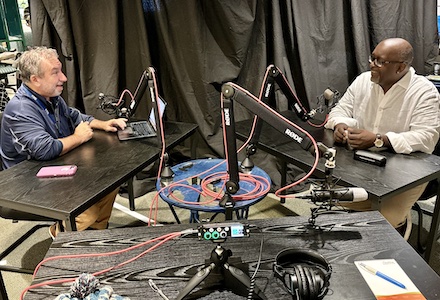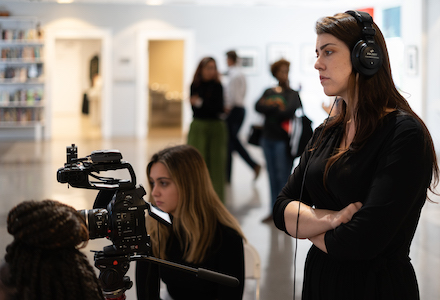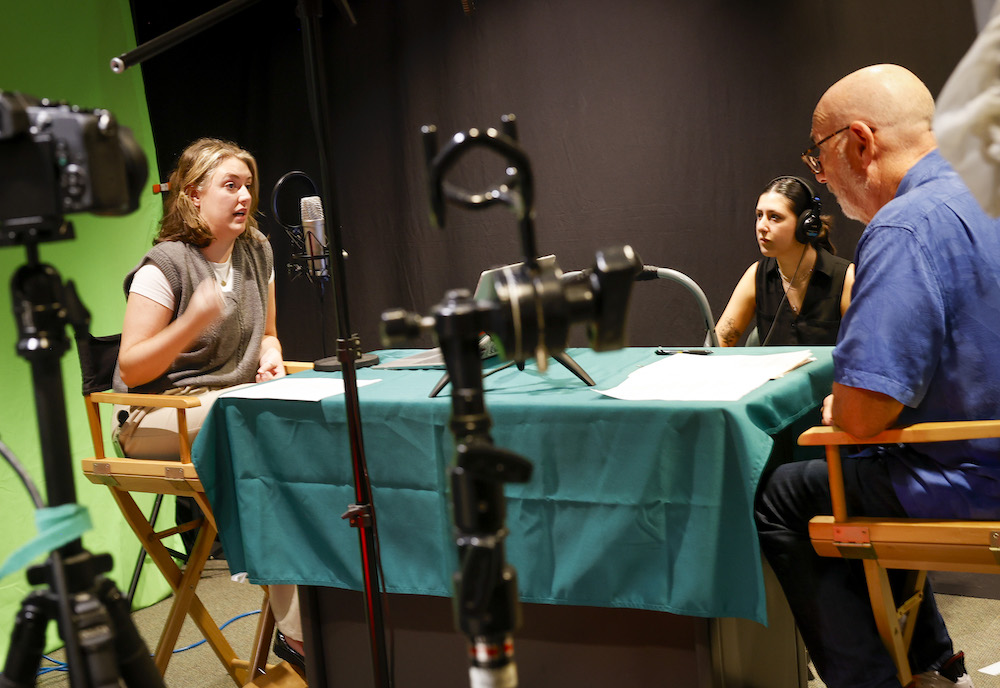By Matthew Cimitile, University Communications and Marketing
The Poynter Institute for Media Studies is an internationally known non-profit that trains many of the world’s best journalists. This year, students from USF St. Petersburg are getting the rare opportunity to work with representatives from the organization to develop the skills needed to thrive in a changing media environment.
Poynter and the USF St. Petersburg Department of Journalism and Digital Communication are developing a podcast series on the many issues impacting journalism and journalists, especially during an election year. They are also strengthening the Neighborhood News Bureau, the working student-newsroom that covers a historic African American neighborhood of St. Petersburg.
"Poynter's partnership with USF St. Petersburg’s Journalism department is a fabulous combination of big ideas and on-the-ground learning,” said Neil Brown, president of the Poynter Institute. “We share a mission of improving the craft and reach of journalism. We both understand that journalists need to reach audiences with a variety of approaches to reporting, storytelling and education. Poynter's work with professionals and USF's work with students is an ideal alignment to help our institutions be of service to the industry and to our local community.”
After a successful run last year producing a podcast series with the Tampa Bay Times called “Florida in Depth,” the department is now teaming up with Poynter on a media-focused podcast. Called “The Poynter Report,” the first season will feature eight episodes with local and national journalists discussing political journalism, the business of news, ethics and more. A second season will debut in January.

Poynter Report host Tom Jones (left) interviews NPR TV Critic Eric Deggans for the first episode of the podcast.
Each episode is hosted by veteran journalist Tom Jones, a senior media writer with Poynter, and executive produced by USF Journalism Instructor Elliott Wiser.
The podcast will not only give listeners greater understanding of the media landscape but also provide essential skills for journalism students. For each episode, students conduct extensive research about the issue being discussed and develop questions to be asked on the podcast. Students also help with coordination leading up to the podcast, and then work on various studio tasks to produce the final product as well as marketing efforts to expand viewership.
“For many students, this podcast will provide their first professional journalism situation, working with real journalists to produce something that can be accessed globally,” Wiser said. “Poynter is the journalism think tank for the entire world, so providing students with this type of exposure doesn’t happen many other places.”
The first episode will drop on September 23 and can be streamed on Apple, Spotify and Amazon. A second podcast series, diving into the cutting-edge technologies that shape our understanding of the ocean, is in production with USF’s College of Marine Science and slated to go live next semester.
Journalism students will get additional hands-on training this year through the Neighborhood News Bureau (NNB). A class of 17 students will learn what it’s like to work out of a daily newsroom, covering the issues impacting the Midtown neighborhood of St. Petersburg.
In previous years, NNB classes have investigated lead in local drinking water and developed the NNB Black History project, which chronicles the storied past of St. Petersburg’s African-American communities through multimedia, oral histories, digital story mapping and a searchable database.

Students with the Neighborhood News Bureau as they developed multimedia content for a news assignment.
“Students in the Neighborhood News Bureau will come to see how community journalism works as they learn about the people living in a place and the issues they deal with every day,” said Angie Taylor, assistant instructor and director of the NNB. “Our goal is to have a presence in the community to ensure overlooked voices are heard and stories are told.”
Students in NNB are conducting local research and starting to hear from stakeholders in the community to get a better sense of the important issues of the day, such as the redevelopment of the Historic Gas Plant District. Utilizing resources and expertise from the Poynter Institute will open new avenues for education and collaboration within NNB, as well as expand skills-based opportunities for students.
All news from NNB will appear on their website.
“Universities sometimes have a reputation of being insular, but in journalism, our professors and students really need to be active participants in understanding and documenting the daily concerns and solutions of the community,” said Mark Walters, chair of USF’s Journalism Department. “This collaboration with Poynter will further involve our students in their community, while providing them with direct reporting experience.”
